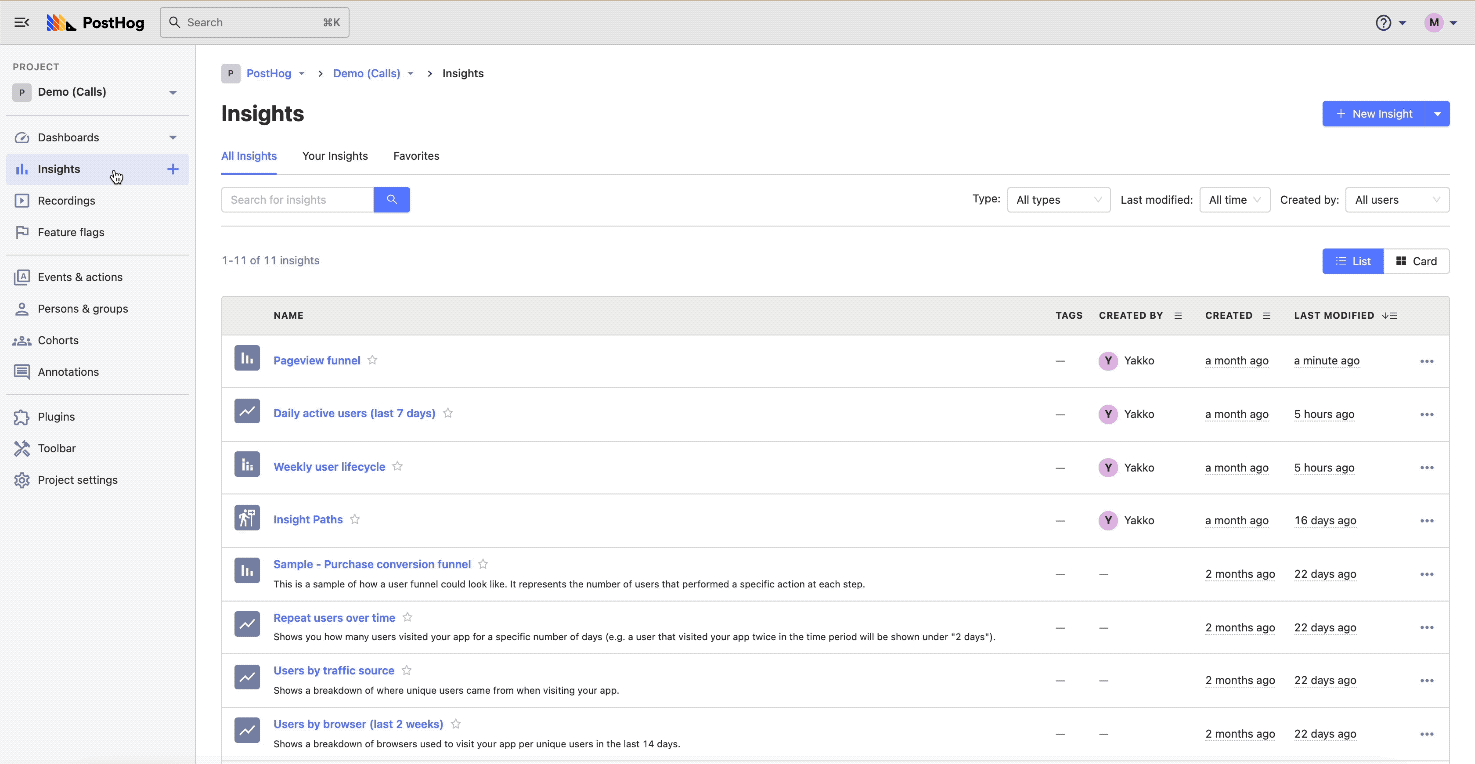Docs - Using PostHog - Roadmap - Bug report
- Specify events manually, or use autocapture to get started quickly
- Analyze your data with visualizations and session recordings
- Improve your product with A/B testing and feature flags
- Keep control over your data by deploying PostHog on your infrastructure
- Use apps to connect to external services and manage data flows
The fastest and most reliable way to get started with PostHog is signing up for free to PostHog Cloud or PostHog Cloud EU
Deploy a hobby instance in one line on Linux with Docker (recommended 4GB memory):
/bin/bash -c "$(curl -fsSL https://raw.githubusercontent.com/posthog/posthog/HEAD/bin/deploy-hobby)" Good for <100K events ingested monthly. See our docs for more info and limitations.
We bring together all the tools and data in one place to help you build better products
- Event-based analytics: capture your product's usage automatically, or customize it to your needs
- User and group tracking: understand the people and groups behind the events and track properties about them
- Data visualizations: create and share graphs, funnels, paths, retention, and dashboards
- Session recording: watch videos of your users' behavior, with fine-grained filters and privacy controls
- Heatmaps: see where users are using your product with the PostHog Toolbar
- Feature flags: test and manage the rollout of new features, target specific users and groups
- A/B and multi-variate testing: run simple or complex changes as experiments and get automatic significance calculations
- Correlation analysis: discover what events and properties correlate with success and failure
- Complete control over your data: host it yourself on any infrastructure
- Import and export your data: import from and export to the services that matter to you with apps
- Ready-made libraries: we’ve built libraries for JavaScript, Python, Ruby, Node, Go, Android, iOS, PHP, Flutter, React Native, Elixir, Nim, and an API for anything else
- Plays nicely with data warehouses: import events or user data from your warehouse by writing a simple transformation plugin, and export data with pre-built apps - such as BigQuery, Redshift, Snowflake, and S3
Read a full list of PostHog features.
Read how to deploy, integrate, and extend PostHog in our documentation.
Check out our tutorials for step-by-step guides, how-to's, and best practices.
Learn more about getting the most out of PostHog's features in our product manual.
Ask a question to get support.
We <3 contributions big and small. In priority order (although everything is appreciated) with the most helpful first:
- Vote on features or get early access to beta functionality in our roadmap
- Open a PR (see our instructions on developing PostHog locally)
- Submit a feature request or bug report
Our mission is to increase the number of successful products in the world. To do that, we build product and data tools that help you understand user behavior without losing control of your data.
In our view, third-party analytics tools do not work in a world of cookie deprecation, GDPR, HIPAA, CCPA, and many other four-letter acronyms. PostHog is the alternative to sending all of your customers' personal information and usage data to third-parties.
PostHog gives you every tool you need to understand user behavior, develop and test improvements, and release changes to make your product more successful.
PostHog operates in public as much as possible. We detail how we work and our learning on building and running a fast-growing, product-focused startup in our handbook.
This repo is available under the MIT expat license, except for the ee directory (which has it's license here) if applicable.
Need absolutely 💯% FOSS? Check out our posthog-foss repository, which is purged of all proprietary code and features.
Using premium features (contained in the ee directory) with a self-hosted instance require a PostHog license. To learn more, book a demo or see our pricing page.
Come help us make PostHog even better. We're growing fast and would love for you to join us.






